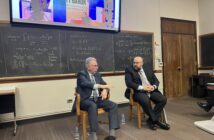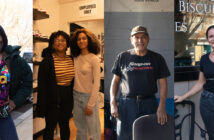
Cheryl Matherly is the vice president and vice provost for International Affairs. Matherly will be moderating a panel during the 100th anniversary of the ILO conference this Thursday, April 11, 2019, at Lehigh University. (Courtesy of Cheryl Matherly)
Cheryl Matherly, vice president and vice provost for International Affairs, will serve as the moderator on the “Effective Lifelong Learning Systems at Work” panel at the International Labor Organization (ILO) centenary conference held at Lehigh on April 11. Matherly’s office, which helps expose Lehigh students to international opportunities, has been the key organizer for Lehigh in planning the conference. As part of a series of Q&As with speakers, moderators and panelists who will take part in the conference, entitled “An Equitable and Sustainable Future of Work,” The Brown and White sat down with Matherly to discuss her role in planning the event and her expertise with global trends impacting the future of employability in anticipation of the conference. This Q&A has been edited for length and clarity.
Q: Even given the partnership between Lehigh and the U.N., this event appears to be a really big deal for your office. How has the anticipation for this big of an event been?
Cheryl Matherly: It’s an honor. It reflects both the strength of the partnership — the respect for Lehigh and what we are able to do with the U.N. — and the significance of (Bethlehem), a reminder that the university is part of the place.
We have also had stellar support from across the university. While we’ve taken the lead, we’ve had an advisory committee that’s brought people from all across campus together to help support the effort in terms of planning, in terms of contributing speakers and participants, some financial participation and logistics.
Q: Moving forward, has this event been a springboard for future ideas or partnerships? There are a variety of speakers from different groups around the world. Has there been any leveraging going on?
CM: We’re certainly very aware of the caliber of the people that we’ve been able to attract. Some of those have come through our Lehigh connections, some have come through U.N./ILO connections.
So part of my answer is that the conference reflects relationships that we’re already leveraging. But at the same time, we’re also recognizing that this is an opportunity to leverage off new relationships.
There are some people that are coming who have never been to Lehigh before, and we’re looking at that group and help them learn more about what’s happening at the university and connect them to other people who have similar interests.
There have been some individual meetings set up on the side of the conference with different people who are participating. Take, Magnolia Movido, who is from GlobalMindED and on my panel. A lot of what her organization does is support low-income, first-generation students, and we have some time for her to connect with the Center for Student Academic Success and Donald Outing’s office.
Q: In the title of the panel you’ll be moderating, it mentions “Lifelong Learning.” What does this mean to you?
CM: The whole topic is embedded in the kind of changes that are happening in the workplace. We’re going to end up talking in the session about some of the factors that are contributing to that, the way technology is changing, shifting demographics in the U.S. and other countries.
So what are the forces at play and what does that mean for people that are entering the workforce? Certainly, for someone who is coming out of a four-year institution like Lehigh, but also what does it mean for anybody who is in the workforce?
When we talk about ‘lifelong learning,’ it’s the idea of how you remain relevant in this highly changing environment. What does that mean in terms of reskilling, upskilling, etc. in order to be able to find your place in that market.
Those are going to be the kinds of things we’re exploring, and with that it has some very particular implications for education and how we’re preparing people. Most of the jobs that students who are in college now will be doing in the future are jobs that don’t even exist right now. That suggests a pretty fundamental change in the way that we go about doing our role and our duty in educating people.
For example, Georgia Tech just released a report where they’re envisioning higher education in 2050. They do this way out look into what Georgia Tech will look like then. One of their ideas that I think is a good example of a very different way of thinking about things is that, perhaps, people would develop a subscription relationship with Georgia Tech.
When you’re admitted, you’re not just thinking just in terms of your four-year degree. You would continue to pay like a subscription model so anytime you need to come back and tool up on something you can say, “Hey I’ll go back over and I’m going to take this certificate or do this online training or graduate degree.”
Q: What does all of this have to do with International Affairs?
CM: When we think about the work that we’re doing here — and when we talk about the importance of the international education experience as being fully embedded in the Lehigh experience — it’s because we think that the kinds of skills and mindsets that you develop from participating in the abroad programs are exactly the kind that are relevant for this changing environment.
We see it as part of that building of a portfolio of someone who’s going to be competitive when they graduate into this global market. So we do talk about these kinds of issue around here and view things in that context.
It may seem that what happens with the Center for Career and Professional Development is a little more directly related to that, but we actually see ourselves as partners in that effort because of how the programs we do around here are related to that.
Q: When you talk about those skills that crossover between this conference and your office, how would you embody them in a few words or a few concepts?
CM: In part, it’s understanding global systems and interconnectedness of what happens here in the context of an interconnected global network.
The ability to shift perspectives and understand the world from the perspective of somebody different from yourself. I just got back from Lima, Peru and met one of our study abroad students there. Those who are thinking about work and education in Lima have a different context that is distinct from ours — and may not share some of the same values or may come to different conclusions about things — but it’s grounded in a particular context that is a rational way to do that.
A third one is the tolerance for being able to make decisions in ambiguous situations. One of the things that happens anytime you’re dealing with something abroad is that you’re in that situation where rules aren’t as clear to you. You have to go in and figure out those things.
And a comfort level with being a personal risk taker comes back to that idea of self-efficacy responsibility.
Those are all things I pick that I know, exactly, that people get from these experiences that apply.





Comment policy
Comments posted to The Brown and White website are reviewed by a moderator before being approved. Incendiary speech or harassing language, including comments targeted at individuals, may be deemed unacceptable and not published. Spam and other soliciting will also be declined.
The Brown and White also reserves the right to not publish entirely anonymous comments.